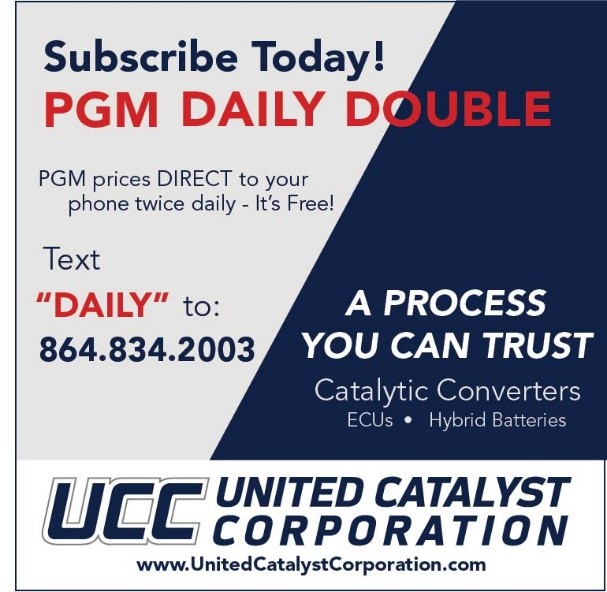Critical Minerals and Metals: Catalytic Converters and EV Batteries
It is hard to imagine our lives without high-tech devices. Everything we touch or drive seems to have an electronic brain. Just try to order a new vehicle during the semiconductor chip shortage. Roughly 60,000 to 70,000 unfinished vehicles sit in storage lots around assembly plants waiting for chips and related components.
What exactly does this have to do with automotive recycling? Critical minerals and metals power High-tech devices. The automobile is the largest secondary source of the critical technology minerals and metals needed today, followed by electronics and appliances.
Semiconductors are an essential component of electronic devices, enabling advances in communications, computing, healthcare, military systems, transportation, clean energy, and countless other applications. The U.S. has an abundant supply of minerals and metals—like gold, copper, molybdenum, silver, and uranium—essential for the technology industry. Additionally, are the critical metals: rare earths (REE), platinum group elements, niobium, tantalum, indium, tungsten, lithium.
How rare are rare earth elements? A common misconception is that rare earth elements are rare. The truth is that the most common rare earth elements, like copper and lead, are found on every continent, on the ocean floor, and in almost all the technologies we use today.
Does China control the supply of rare earth elements? In the late 1970s to mid-1990s, China increased the annual production of rare earths and flooded the marketplace, which dramatically dropped the prices of REEs. More recently, China bought a controlling interest in rare earth mines in the US and Australia. Therefore, many say that China controls the supply of rare earth elements.
Where on the vehicle are the critical minerals and metals found? The platinum group and rare earth elements are found throughout the vehicle in catalytic converters, electronic control modules or car brains, magnets of all sorts, and electric vehicle batteries.
 In the fall of 2021, at the 78th Annual ARA Convention & Expo, in Dallas, TX, we assembled an expert panel to discuss what “electrification” will mean for automotive recycling. Dirk Spiers, Founder of Spiers New Technologies, and Lea Malloy, Head of EV Battery Solutions of Cox Automotive Mobility, now partners, provided an update on what they hope to be a “one-stop” solution for battery life cycle management to include both reuse and recycle. Matt Watson, Director of Precious Metals Commodity Management LLC, presented research on energy trends and the heightened critical mineral demands of the future. Watson told the audience that copper and silver drive the electrification of everything and will be in high order. Silver is the best conductor of energy, with copper a close second, gold and expensive third, and aluminum a distant 4th. He stated that 560 metric tons of copper had been mined in the past 1,000 years. We will need double that amount for the next 30 years for clean energy and the electrification of everything.
In the fall of 2021, at the 78th Annual ARA Convention & Expo, in Dallas, TX, we assembled an expert panel to discuss what “electrification” will mean for automotive recycling. Dirk Spiers, Founder of Spiers New Technologies, and Lea Malloy, Head of EV Battery Solutions of Cox Automotive Mobility, now partners, provided an update on what they hope to be a “one-stop” solution for battery life cycle management to include both reuse and recycle. Matt Watson, Director of Precious Metals Commodity Management LLC, presented research on energy trends and the heightened critical mineral demands of the future. Watson told the audience that copper and silver drive the electrification of everything and will be in high order. Silver is the best conductor of energy, with copper a close second, gold and expensive third, and aluminum a distant 4th. He stated that 560 metric tons of copper had been mined in the past 1,000 years. We will need double that amount for the next 30 years for clean energy and the electrification of everything.
Companies like United Catalyst Corporation are helping recyclers with profitable recycling programs for mineral-rich parts, namely catalytic converters, automotive electronics, harness wire, and EV batteries. Programs that take catalytic converters from a used part to precious metal to be sold on the open market. Programs allow recyclers to sell gold, silver, copper, and aluminum from other valuable vehicle scrap. And soon, programs that help direct recyclers in selling EV batteries. Remanufacturing and reuse, as a rule, tend to be more profitable than recycling. A decision tree forms depending on the battery’s chemistry, the state of charge, and logistics.
The bottom line is that it is a great time to be in recycling. These critical technology metals will be in demand, and auto recyclers will have a continuous supply. The prices for these metals are likely to climb over the long term. Since recycling has a lower carbon footprint than mining, many OEMs get higher credits for using recycled ounces than mined ounces. This is more good news for auto recyclers.
If you have questions about this article or any issue pertaining to the recovery of precious metals and materials from automotive recycling, we at United Catalyst are here to help you. United Catalyst Corporation is a processor of scrap catalytic converters that offer global refining services. Our recycling solutions are accurate, scientific, and verifiable to get you the most money. United Catalyst is a processor you can trust.
To subscribe to our daily e-newsletter or get Platinum Group Metal prices texted twice daily to your phone, TEXT DAILY to 864-834-2003. You can also email us at [email protected].
